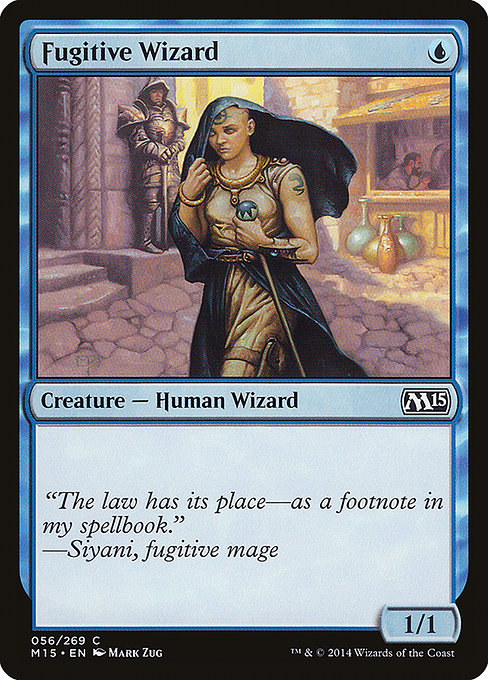
Image courtesy of Scryfall.com
Rarity Iconography Across MTG: Decoding Fugitive Wizard
In Magic: The Gathering, rarity is more than a number on a card’s corner—it's a visual language that quietly communicates a card’s role, its pickup-and-play potential, and its place in the vast ecosystem of drafts, duels, and collector shelves 🧙♂️. The Fugitive Wizard, a blue one-drop from Magic 2015 (M15), is a compact exemplar of this design rhetoric. With cost {U}, a 1/1 body, and an empty oracle text, it invites players to appreciate what rarity signals beyond raw text: scarcity, draft relevance, and the tactile drama of foil vs. nonfoil stock 🔎💎.
Fugitive Wizard arrives as a common in a core-set frame that deliberately foregrounds accessibility. The card’s power level is modest, but its presence in modern formats—pioneer, modern, legacy, and even limited—speaks to the broader design philosophy: ease of splash, speed of deployment, and the joy of pulling a blue creature into a control-leaning or tempo-oriented plan. The flavor text—“The law has its place—as a footnote in my spellbook.” —Siyani, fugitive mage—hints at a larger story of mischiefs and margins where blue magicians flourish as clever, law-bending improvisers 🧭⚔️.
“The law has its place—as a footnote in my spellbook.” —Siyani, fugitive mage
When you look closely at the card’s rarity indicator, Fugitive Wizard gives us a textbook case of the design language at work. In MTG’s ecosystem, the color of the set symbol near the bottom of the card is a reliable beacon of rarity. Core sets like M15 still adhere to the four-tiered spectrum—black for common, silver for uncommon, gold for rare, and orange for mythic rare—across many print runs. That tiny gem communicates a lot: where the card sits in price, how often you’ll see it in draft pools, and whether a foil treatment is likely to appear on the table (and in your binder) 🔷💎.
What Fugitive Wizard Reveals About the Design Language
- Color and identity: The blue mana cost instantly signals control and tempo themes. Its rarity indicator sits alongside the set symbol, reinforcing that this is a deck-friendly common rather than a flashy rare. The shade of blue and the overall frame work together with a black border to keep the presentation clean and legible in a crowded battlefield 🧙♂️.
- Symbol as signal: The rarity is primarily conveyed by the color of the expansion symbol rather than any aggressive typography or border flourish. In M15’s core-set era, you’d expect the common icon to read as unobtrusive—no gilding, no extravagant chrome—so players can recognize value without distraction when drafting or trading ⚙️.
- Foil vs nonfoil tension: The card’s data shows both foil and nonfoil finishes exist, with the foil not always being price-prohibitive for commons. Foil variants attract casual collectors and players who enjoy the tactile sparkle, and the rarity language remains consistent across finishes. That consistency—foil or not—helps players trust the system when building decks or chasing a specific look 🔥💎.
- Flavor text and lore alignment: The flavor text adds personality without overpowering the mechanical heft. A rare or mythic might lean into grand lore; a common can anchor a character in a quick, memorable moment. The artistry by Mark Zug in this print pair reinforces how art direction contributes to the perception of rarity—fewer embellishments, but a punchy, memorable image 🎨.
- Collector value mindset: For new players, rarities guide draft strategy; for collectors, they frame price and desirability. The rarity language isn’t just about scarcity; it’s about how a card slots into your collection narrative—the blue 1/1 that edges into tempo plays, the art that fans memorize, and the foil that catches the eye in a binder spread 💎🧭.
Practical Implications for Players and Collectors
Understanding rarity indicators helps you draft with intent. In M15—Fugitive Wizard’s home set—the common rarity signals you’ll encounter many copies in a draft, so you lean on your pool's tempo and synergy rather than banking on a single powerhouse. If you’re a commander aficionado, the common’s speed and universality make it a reliable early-game drop, while its flavor text and lore attach a character to your blue-centric themes. And for collectors, the existence of a foil option, even for commons, provides an avenue for tactile nostalgia without forcing a premium price tag on the card’s nominal power 🔷🧙♂️.
From a game-design perspective, the elegance of rarity indicators lies in their subtlety. The audience decodes a dozen micro cues in a heartbeat: mana color, card type, set type, and the tiny rarity gem. When these cues harmonize—blue tempo, 1/1 statline, and a common rarity marker—the card becomes not just a card, but a tiny ambassador for a whole color-simple mythos. The Fugitive Wizard embodies that balance: a humble, effective spell-caster whose value isn’t in flashy text but in the culture of design that makes MTG feel like a shared language 🧙♂️🎲.
Phone Grip Click-On Universal KickstandMore from our network
- https://blog.digital-vault.xyz/blog/post/mana-efficiency-vs-impact-ratio-caves-of-chaos-adventurer/
- https://crypto-acolytes.xyz/blog/post/nft-stats-malware-303-from-malware-relics-collection/
- https://x-landing.zero-static.xyz/4bb26749.html
- https://rusty-articles.xyz/tmp2wymbjx_/index.html
- https://crypto-acolytes.xyz/blog/post/nft-stats-lnl-1102-from-long-neck-legends-collection/

Fugitive Wizard
ID: 520ad9d0-5f41-4183-a04e-58a61ad7202b
Oracle ID: 381fa2a9-69fc-4558-a0ac-fb99c6f8d77f
Multiverse IDs: 383249
TCGPlayer ID: 90905
Cardmarket ID: 267570
Colors: U
Color Identity: U
Keywords:
Rarity: Common
Released: 2014-07-18
Artist: Mark Zug
Frame: 2015
Border: black
EDHRec Rank: 26536
Set: Magic 2015 (m15)
Collector #: 56
Legalities
- Standard — not_legal
- Future — not_legal
- Historic — not_legal
- Timeless — not_legal
- Gladiator — not_legal
- Pioneer — legal
- Modern — legal
- Legacy — legal
- Pauper — legal
- Vintage — legal
- Penny — legal
- Commander — legal
- Oathbreaker — legal
- Standardbrawl — not_legal
- Brawl — not_legal
- Alchemy — not_legal
- Paupercommander — legal
- Duel — legal
- Oldschool — not_legal
- Premodern — legal
- Predh — legal
Prices
- USD: 0.04
- EUR: 0.03
- EUR_FOIL: 0.14
- TIX: 0.04
More from our network
- https://crypto-acolytes.xyz/blog/post/nft-stats-pirate-115-from-golden-pirates-collection/
- https://blog.crypto-articles.xyz/blog/post/nft-data-pfp-656-from-pumpfun-pepe-collection-on-magiceden/
- https://crypto-acolytes.xyz/blog/post/nft-stats-doodle-bonk-2327-from-doodle-bonk-collection/
- https://articles.zero-static.xyz/blog/post/jayas-firenado-and-reds-color-pie-philosophy-unpacked/
- https://blog.crypto-articles.xyz/blog/post/news-sparks-on-chain-momentum-for-solana-meme-coin/
